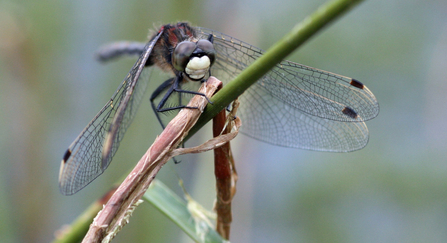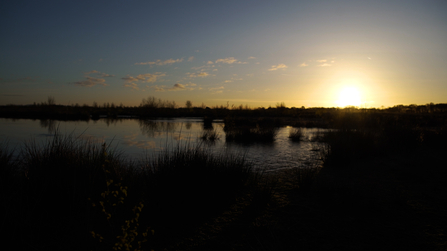The Wildlife Trust for Lancashire, Manchester and North Merseyside has received funding from Biffa Award to protect and restore a rare fragment of peatland in Greater Manchester. Once part of Chat Moss, one of the UK’s largest lowland raised peat bogs, the site known as Rindle Moss will form a vital stepping stone for wildlife in the area, including the endangered white-faced darter dragonfly.
£670,000 awarded to connect Greater Manchester’s mosslands

Male white-faced darter dragonfly - Vicky Nall
Habitat restoration works will be undertaken on both the newly acquired site and on Little Woolden Moss, another peatland nature reserve owned by the Trust, which sits just to the south. This crucial site in Chat Moss, which is key in Greater Manchester’s plans for nature recovery, will provide the start of a wildlife corridor for both the white-faced darter and many other species, supporting aims to create a landscape-scale nature network across the Great Manchester Wetlands.

Biffa Award is a multi-million pound fund that helps to build communities and transform lives by awarding grants to communities and environmental projects across England and Wales.
The funding also covers the purchase of an adjoining area of agricultural land which will be transformed into an exciting paludiculture, or wetter-farming, trial.
Around 99 per cent of Chat Moss has been lost through drainage for development and agriculture, which results in large amounts of carbon being released into the atmosphere, contributing to climate change. In their natural wet, boggy state, peatlands are able to absorb and store carbon, locking it away in their peaty soils. However as soon as they are drained or damaged in any way this carbon gets released.
Lancashire Peatlands Initiative Project Officer, Mike Longden, said “The wetter-farming trial will re-wet the field, raising the water table to its natural level (also benefitting Rindle Moss next door), which can almost immediately halt the release of carbon. Once re-wet, a series of crops will be planted which thrive in these wetter conditions, aiming to identify financially viable and climate friendly land management options which could be adopted in the future to help us to reach net zero targets.”

Little Woolden Moss - Standby Productions
And if all of that wasn’t enough, the project will also include improvements and additions to pathways and information boards on Little Woolden Moss. The aim is to engage the local community with the amazing peatland habitats on their doorsteps, maybe even encouraging them to volunteer to help plant some of the 100,000 plug plants which will be a vital part of the habitat restoration portion of the project.
Rachel Maidment, Biffa Award Grants Manager, said: “It is hugely important that Biffa Award continues to support projects that help to promote nature’s recovery, like this one at Rindle Moss which will restore and conserve vitally important peatland habitat. We are privileged to be able to support the Wildlife Trust for Lancashire, Manchester and North Merseyside’s ambitious project through our Rebuilding Biodiversity theme.”
It is hugely important that Biffa Award continues to support projects that help to promote nature’s recoveryBiffa Award
The project has also been made possible due to funding and support from; Natural England, Wigan Council, Salford City Council, Hamilton Davies Trust and Greater Manchester Combined Authority.
Ginny Hinton, Area Manager for Natural England, commented; “I am really excited that Natural England could support this project which will restore a large area of peatland and bring more fantastic nature close to where people live. The site can make a significant contribution to capturing carbon in the fight against climate change.”
Director of Environment at Wigan Council, Paul Barton, said: “This project is vital to ensure that Wigan borough’s ambitious climate goals can be achieved in providing eco-system services such as recreation, water management and carbon storage. By working together we can shape a healthier borough, support nature recovery and restore this important bog habitat in an area where it was previously a key feature of the landscape.”
Councillor Sophia Linden, Executive Support Member for Climate Change, Low Carbon and Green Agenda at Salford Council, said: “Salford City Council is very pleased to support the work of Lancashire Wildlife Trust in restoring this important habitat at Little Woolden Moss. The improvements to the footpath network around the site will help people to better access and enjoy this amazing, ecologically vital landscape. Access to local greenspace is so important in improving peoples’ mental health and well-being, and this has become particularly clear in the current circumstances.”
Tony Prescott, Operations Manager at Hamilton Davies Trust, said “We are pleased to support the Lancashire Wildlife Trust with a financial contribution which enabled them to access a substantial funding pot from Biffa Award. The Mosslands Connect Project is a vital initiative which directly impacts accessibility and community engagement across Chat Moss, in turn making our local areas of Irlam, Cadishead and Rixton-with-Glazebrook, even better places to live, work and enjoy.”

